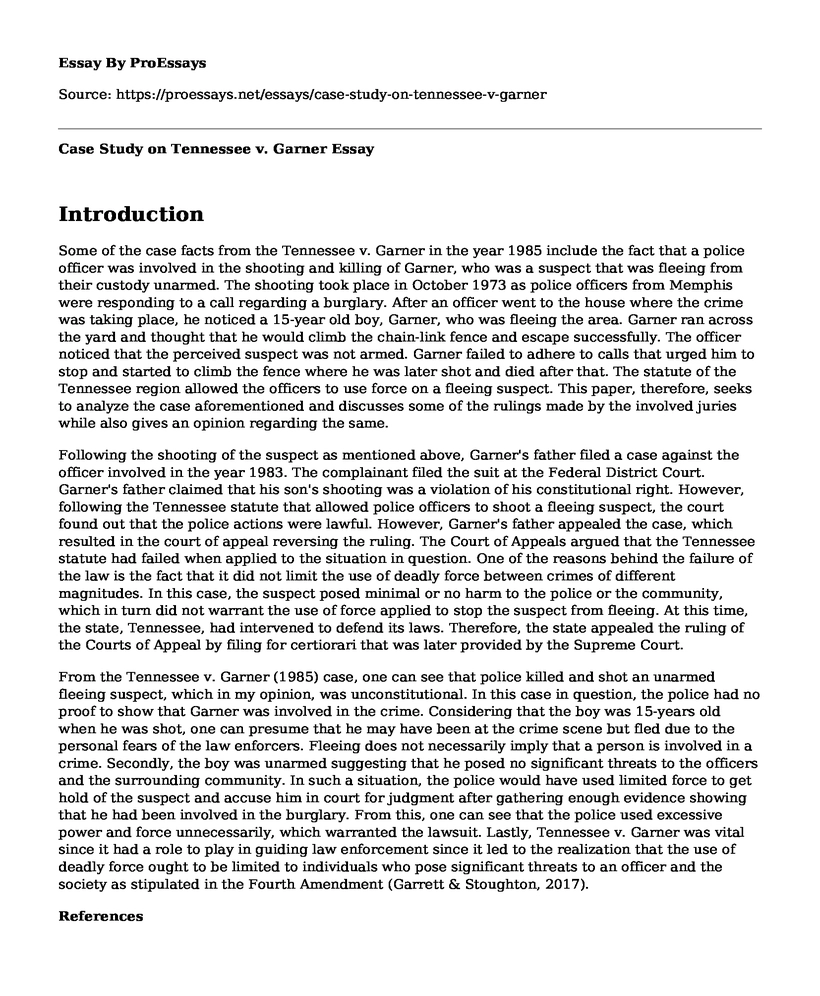Introduction
Some of the case facts from the Tennessee v. Garner in the year 1985 include the fact that a police officer was involved in the shooting and killing of Garner, who was a suspect that was fleeing from their custody unarmed. The shooting took place in October 1973 as police officers from Memphis were responding to a call regarding a burglary. After an officer went to the house where the crime was taking place, he noticed a 15-year old boy, Garner, who was fleeing the area. Garner ran across the yard and thought that he would climb the chain-link fence and escape successfully. The officer noticed that the perceived suspect was not armed. Garner failed to adhere to calls that urged him to stop and started to climb the fence where he was later shot and died after that. The statute of the Tennessee region allowed the officers to use force on a fleeing suspect. This paper, therefore, seeks to analyze the case aforementioned and discusses some of the rulings made by the involved juries while also gives an opinion regarding the same.
Following the shooting of the suspect as mentioned above, Garner's father filed a case against the officer involved in the year 1983. The complainant filed the suit at the Federal District Court. Garner's father claimed that his son's shooting was a violation of his constitutional right. However, following the Tennessee statute that allowed police officers to shoot a fleeing suspect, the court found out that the police actions were lawful. However, Garner's father appealed the case, which resulted in the court of appeal reversing the ruling. The Court of Appeals argued that the Tennessee statute had failed when applied to the situation in question. One of the reasons behind the failure of the law is the fact that it did not limit the use of deadly force between crimes of different magnitudes. In this case, the suspect posed minimal or no harm to the police or the community, which in turn did not warrant the use of force applied to stop the suspect from fleeing. At this time, the state, Tennessee, had intervened to defend its laws. Therefore, the state appealed the ruling of the Courts of Appeal by filing for certiorari that was later provided by the Supreme Court.
From the Tennessee v. Garner (1985) case, one can see that police killed and shot an unarmed fleeing suspect, which in my opinion, was unconstitutional. In this case in question, the police had no proof to show that Garner was involved in the crime. Considering that the boy was 15-years old when he was shot, one can presume that he may have been at the crime scene but fled due to the personal fears of the law enforcers. Fleeing does not necessarily imply that a person is involved in a crime. Secondly, the boy was unarmed suggesting that he posed no significant threats to the officers and the surrounding community. In such a situation, the police would have used limited force to get hold of the suspect and accuse him in court for judgment after gathering enough evidence showing that he had been involved in the burglary. From this, one can see that the police used excessive power and force unnecessarily, which warranted the lawsuit. Lastly, Tennessee v. Garner was vital since it had a role to play in guiding law enforcement since it led to the realization that the use of deadly force ought to be limited to individuals who pose significant threats to an officer and the society as stipulated in the Fourth Amendment (Garrett & Stoughton, 2017).
References
Garrett, B., & Stoughton, S. (2017). A Tactical Fourth Amendment. Virginia Law Review, 103(2), 211-307. Retrieved from http://search.ebscohost.com/login.aspx?direct=true&db=bth&AN=122617741&site=ehost-live
Cite this page
Case Study on Tennessee v. Garner. (2022, Nov 25). Retrieved from https://proessays.net/essays/case-study-on-tennessee-v-garner
If you are the original author of this essay and no longer wish to have it published on the ProEssays website, please click below to request its removal:
- Data Security Regulation Requirements Essay
- Master's in Crime Scene Investigation Essay
- Incarceration in Texas - Essay Sample
- Research Advances Criminal Justice Knowledge: Benefits for Students & Professionals - Research Paper
- Michigan's Successful Strategy to Reduce Recidivism and Prison Populations - Essay Sample
- Essay Examples on Gun Laws: A Global Human Rights Crisis
- Roles of the United Nations Inside Middle East Prisons, How This Affects Prisoners Health - Essay Sample







